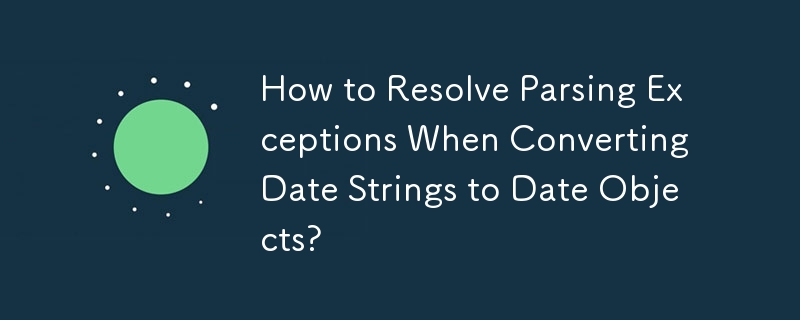Home >Java >javaTutorial >How to Resolve Parsing Exceptions When Converting Date Strings to Date Objects?
How to Resolve Parsing Exceptions When Converting Date Strings to Date Objects?
- Linda HamiltonOriginal
- 2024-11-17 08:12:03429browse

Parsing Date Strings to Date Objects: Resolving Parsing Exceptions
When attempting to parse a date string into a Date object, exceptions may arise due to incorrect formatting patterns. To resolve these exceptions, it is crucial to adhere to standardized formatting conventions.
Addressing the Specific Issue:
The provided example throws a parsing exception due to inconsistencies in the pattern provided to the SimpleDateFormat constructor. Specifically:
- Day Abbreviation: Instead of "E", the correct format for a 3-letter day abbreviation is "EEE".
- Month Abbreviation: Similarly, for a 3-letter month abbreviation, "MMM" should be used instead of "MM".
- Locale: To ensure parsing accuracy, the locale should be explicitly set to English to avoid potential localization issues.
Revised Formatting Pattern:
The corrected SimpleDateFormat pattern should look as follows:
DateFormat df = new SimpleDateFormat("EEE MMM dd kk:mm:ss z yyyy", Locale.ENGLISH);
Adjusted Code:
Using the revised pattern, the parsing operation will succeed:
String target = "Thu Sep 28 20:29:30 JST 2000"; Date result = df.parse(target); System.out.println(result);
This will now print the correct Date object, taking into account the specified time zone.
Additional Considerations:
- For hour representation, it is generally recommended to use HH (24-hour format) rather than kk (12-hour format) to avoid potential unintended rounding.
- Refer to the official Java documentation for SimpleDateFormat for a comprehensive list of valid pattern characters and guidelines.
The above is the detailed content of How to Resolve Parsing Exceptions When Converting Date Strings to Date Objects?. For more information, please follow other related articles on the PHP Chinese website!

